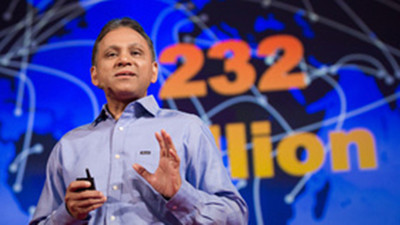I live in Washington, D.C.,but I grew up in Sindhekela, a village in Orissa, in India.
我住在華盛頓特區但我是在新河克拉,印度奧里薩邦的一個小村莊長大。
My father was a government worker.
我父親是個政府雇員,
My mother could not read or write, but she would say to me, A king is worshipped only in his own kingdom. A poet is respected everywhere.
我母親不會讀書寫字,但她跟我說:國王只有在自己的王國里才被膜拜,而詩人走到哪兒都受到尊敬。
So I wanted to be a poet when I grew up.
所以我就想長大后成為一名詩人。
But I almost didn't go to college until an aunt offered financial help.
但是我差點沒上成大學,直到一位姨媽出錢幫我。
I went to study in Sambalpur,the largest town in the region,where, already in college, I saw a television for the first time.
我去了薩姆巴爾普爾,當地最大的城鎮讀書。在那兒上大學的時候,我才第一次看到電視。
I had dreams of going to the United States for higher studies.
那時我夢想去美國接受高等教育。

When the opportunity came,I crossed two oceans, with borrowed money for airfare and only a 20 bill in my pocket.
后來機會來了,我借錢買了機票,橫跨兩個大洋,兜里裝了二十元美金就來了。
In the U.S., I worked in a research center,part-time, while taking graduate classes in economics.
在美國,我一邊在一家研究中心兼職,一邊上經濟學的研究生課程。
And with the little I earned, I would finance myself and then I would send money home to my brother and my father.
雖然掙得不多,我還是一邊供自己上學,一邊寄錢回家給我父親和我兄弟。
My story is not unique.
我這樣的絕不是唯一的。
There are millions of people who migrate each year.
每年有成百上千萬的人移民。
With the help of the family, they cross oceans,
通過家人的幫助,他們跨越大洋,
they cross deserts, they cross rivers, they cross mountains.
沙漠,河流,或者山脈。
They risk their lives to realize a dream,and that dream is as simple as having a decent job somewhere so they can send money home and help the family,which has helped them before.
他們冒著生命危險去實現一個夢想。他們的夢想很簡單,就是能有一份不錯的工作, 讓他們能寄錢回家,幫助他們的家人,那些曾幫助過他們的人。
There are 232 million international migrants in the world.
世界上有兩億三千二百萬國際移民。
These are people who live in a country other than their country of birth.
他們生活在一個不同于他們出生地的國度。
If there was a country made up of only international migrants,that would be larger, in population,than Brazil.
如果有一個國家全部由國際移民組成,它的人口將超過巴西,
That would be larger, in its size of the economy, than France.
它的經濟實力將超過法國。
Some 180 million of them, from poor countries,send money home regularly.
其中一億八千萬的移民來自貧窮的國家,他們按時寄錢回家。
Those sums of money are called remittances.
這些錢叫做移民匯款。
Here is a fact that might surprise you:
這樣一個事實可能會讓你大吃一驚:
413 billion dollars, 413 billion dollars was the amount of remittances sent last year by migrants to developing countries.
4310億美元,去年一共有4310億美元由移民們寄到發展中國家。
Migrants from developing countries,money sent to developing countries a 413 billion dollars.
來自發展中國家的移民,寄到發展中國家的錢,4310億美元。
That's a remarkable number because that is three times the size of the total of development aid money.
這個數字相當驚人,它等于所有發展資助資金總和的三倍。
And yet, you and I,my colleagues in Washington,we endlessly debate and discuss about development aid,while we ignore remittances as small change.
但是,你,我,我在華盛頓的同事們,我們不停地爭辯,討論發展資助,卻把移民匯款當作小錢忽略了。
True, people send 200 dollars per month,on average. But, repeated month after month,by millions of people,these sums of money add up to rivers of foreign currency.
確實,人們平均每月寄兩百美元。但是,月復一月,成百上千萬的人在寄,這些錢匯聚成一條條外幣形成的河流。
So India, last year, received 72 billion dollars, larger than its IT exports.
印度去年收到了720億美元,超過它的IT出口額。
In Egypt remittances are three times the size of revenues from the Suez Canal.
埃及收到的移民匯款達到蘇伊士運河上貿易額的三倍。
In Tajikistan, remittances are 42 percent of GDP.
塔吉克斯坦,移民匯款占GDP的42%。



